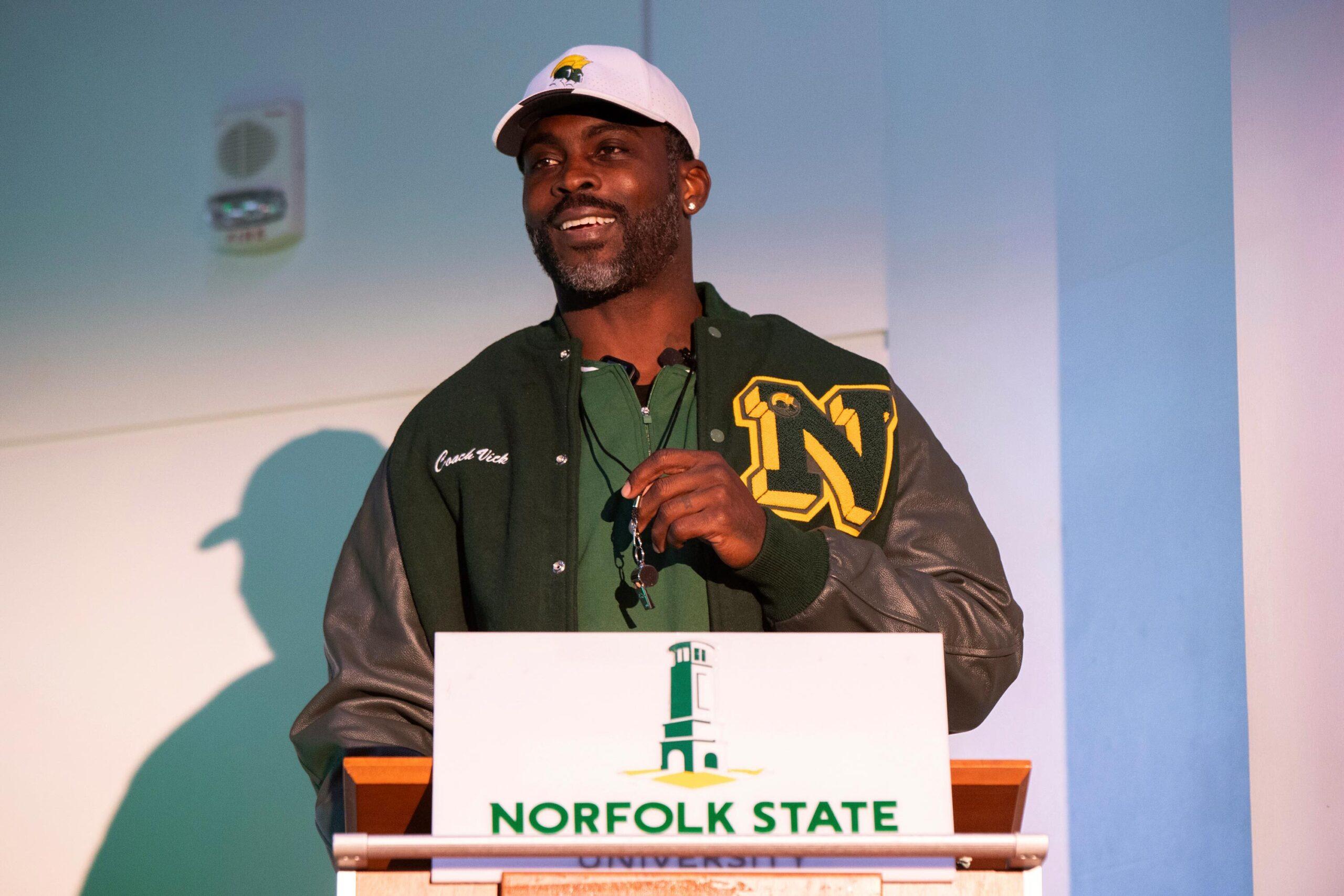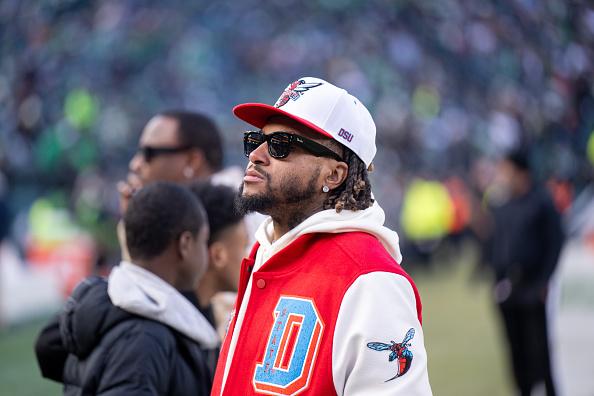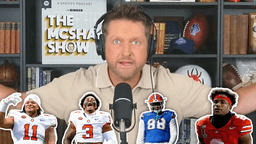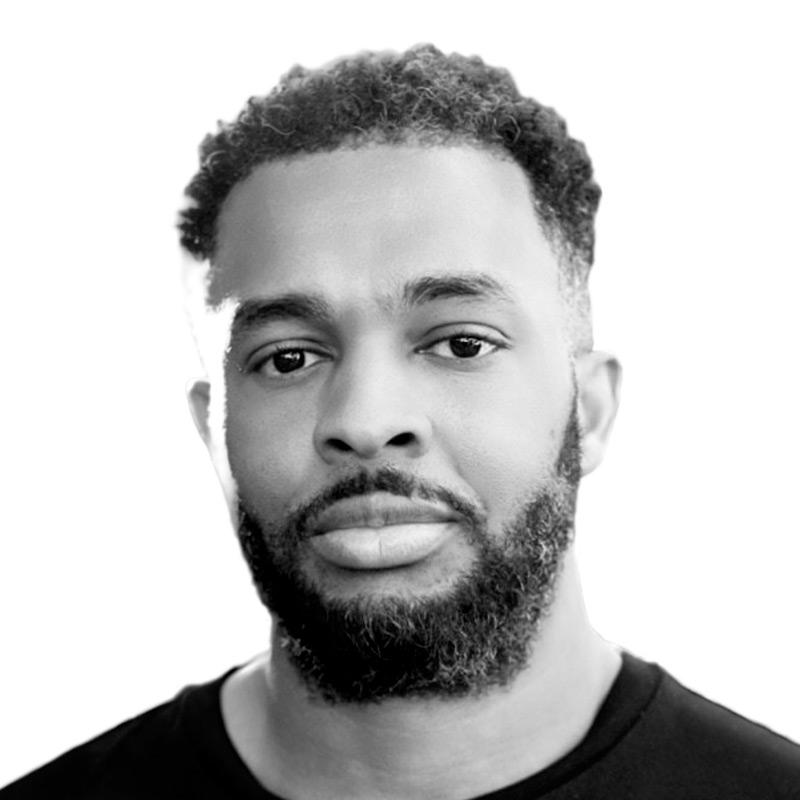Last Tuesday, in a barely air-conditioned concourse inside Baltimore’s M&T Bank Stadium, space around a makeshift TV set was at a premium. Reporters, camera operators, and personal assistants jostled for elbow room while negotiating boundaries with staff members of the Mid-Eastern Athletic Conference.
At the center of the media scrum were old friends and former Philadelphia Eagles teammates DeSean Jackson and LeSean McCoy. And their conversation was part of MEAC football media day, where Jackson was going through his public rollout as the first-year head coach of Delaware State University.
The 38-year-old Jackson still looked like the NFL player he was as recently as three seasons ago, with his trademark stitch braids atop his head and an almost blinding diamond-encrusted pendant around his neck that read “1 of 1.” He wore an untucked white Delaware State polo shirt, black sweatpants, and Dior Jordan 1s—which can retail for as much as $5,000 a pair—looking about as coolly casual as a college football head coach can be.
So when he relayed a story about his early days coaching at Delaware State, it was easy to understand how his players might have confused his youthful look for an informal approach.
“When I first came in, I had a few guys be like, ‘D Jac,’” Jackson said. “I’m like, ‘Who D Jac? My name is Coach Jackson.’”
“And now, our big brother is the head coach of Norfolk State,” McCoy responded, referring to former Falcons and Eagles quarterback Michael Vick, who is also entering his first season as a head coach in the conference.
“Our big bro,” Jackson repeated, chuckling. His eyes briefly scanned the crowd, seemingly looking for his old teammate.
Vick had momentarily ducked into a room behind a curtain, taking a much-needed breather after patiently answering questions about his new professional adventure for more than four hours. Not surprisingly, he was in constant demand, far dwarfing the interest received by all the other coaches assembled in the concourse. He was scheduled to join McCoy on the set minutes after Jackson wrapped up his interview.
The arrival of Vick and Jackson has been a much-needed shot in the arm for the MEAC, a withering conference of historically Black colleges and universities that’s now down to only six programs—Delaware State, Howard, Morgan State, Norfolk State, North Carolina Central, and South Carolina State—after losing five schools to other leagues since 2017.
Some cynics might call their hirings part of “the Deion Sanders effect,” where a struggling HBCU football program (like Jackson State) brings in a charismatic former NFL player in hopes of drawing fan and media attention—and maybe a few top recruits (Travis Hunter and Shedeur Sanders) and transfers who ordinarily wouldn’t consider playing there. Tennessee State had similar success with its 2021 hire of Eddie George, the 1995 Heisman Trophy winner and four-time NFL Pro Bowler. He went 24-22 in four seasons at Tennessee State—and earned the program’s first playoff berth in 12 years—before accepting the same position at Bowling Green in March.
What school wouldn’t want to try to re-create that kind of success, or at least generate the reported $185 million in advertising and exposure that Sanders brought in while at Jackson State?
Few programs could use that sort of boost more than Norfolk State and Delaware State, a pair of perennial FCS doormats that have each had just one season with more than five wins since 2012. Already, after both coaches were hired over the winter, the programs have enjoyed levels of attention and enthusiasm that had eluded them for years. At Norfolk State, local sports icons Allen Iverson and Bruce Smith showed up for Vick’s introductory December press conference. In anticipation of more fan interest this fall, the school has raised season ticket prices from $110 to $200, an 82 percent increase.
At Delaware State, Jackson is the new face of the school’s renewed fundraising efforts. Magic Johnson and alumnus Steve Ewing have combined to donate more than $1.5 million to the university in recent years, and they were also part of a recent campaign that brought in $3 million. But administrators also haven’t been shy about admitting the role that they hope Jackson can play in bringing more media coverage to the school.
“The exposure that we've gotten from DeSean,” Delaware State athletic director Tony Tucker said, “we could have never gotten that with anybody else.”
The conference, similarly, is benefiting. To shake things up for this season, the MEAC moved its annual football media day from its longtime headquarters in Norfolk, Virginia—an old seaport town of 238,000 in the Tidewater region of the state—to the home of the Baltimore Ravens. The league touted the relocation as part of its partnership with the NFL, a wink and a nod to the additions of Vick and Jackson. “This is a historic milestone for the MEAC,” conference commissioner Sonja Stills said in a statement. “Hosting our football media day at an NFL venue reflects the growing visibility, strength, and momentum of our conference. We’re thrilled to showcase our member institutions in such a dynamic and high-profile environment.”
“It’s been amazing—especially having it right here in our own backyard,” Morgan State linebacker Erick Hunter said of the revamped media day. “I’m really enjoying the experience.”
Howard head coach Larry Scott, meanwhile, was leaning against a bar and taking it all in from a comfortable distance. There was no crowd hanging on his every word, no one jockeying to stick a microphone in his face. Scott is entering his sixth year at Howard, and he seemed very much at peace with the difference in attention.
“I think everybody’s excited about the energy,” Scott told me. “I think it’s great for not only the brand, not only for the MEAC, but it’s good for football, and it’s good for young people.”
Scott and his less celebrated counterparts in the league are learning to accept the change—at least for a season—even though they now have to recruit and compete against coaches who dwarf them in name recognition and celebrity.
A day earlier, all six of the conference’s head coaches had met in person to talk about the upcoming season, rules changes, and the state of the league and college football. The same historic changes that have shifted the landscape at the highest levels of college sports have created even more significant challenges for often money-poor HBCUs, from managing NIL deals to competing in the wake of the House v. NCAA settlement, which formally allows schools to share revenue with athletes. HBCUs will now have to be even more creative in their pitches to recruits, who finally have the opportunity to get paid for their performance, or in retaining veteran players, who can—for the moment—transfer without penalty if they earn the attention of a more prominent program.
“We’re going to be as competitive as we can be in the NIL space,” Scott said. “How that looks for us is going to be a little bit more incentive-based instead of paying people up front.”
But the veteran coaches also used the opportunity to size up their newest competition, the former pros who’d skipped the traditional path to becoming a head coach—position coach, then coordinator, then top job—to land their current roles. It’s a bit of a sore spot for some of those guys, in a business where Black assistant coaches often struggle to make meaningful advancements and have been historically underrepresented in the head coaching ranks.
“It’s a new landscape, to be honest with you,” said Morgan State’s Damon Wilson, who worked as an assistant for a decade before becoming the head coach at Bowie State, his alma mater, in 2009.
“It’s something that I don't necessarily support, with regards to guys not having to go through it. But after having a great, candid conversation with Coach Vick and [Jackson] yesterday, we were able to share some ideas. But it’s one of these deals where, man, as long as you have the students first and foremost in your mind, you’ll be OK.”
North Carolina Central head coach Trei Oliver has also been critical of the trend of hiring former NFL players with no previous college coaching experience, once even joking that Colorado could’ve hired him for half as much after his team beat Sanders and Jackson State in the 2022 Celebration Bowl.
A week before media day, at another news conference, Oliver acknowledged that small-school programs like Norfolk State and Delaware State could see a financial benefit to bringing in former pros like Vick and Jackson. “But you know, there are a lot of really good football coaches out there that I think they’re kind of getting overlooked. And it’s their time,” Oliver said.
In Baltimore, Oliver didn’t back down from those comments. “My point is we just have some seasoned coaches that I think will do a very good job. I’m glad to see these guys come in here … but on the flip side, shoot, I coached for 20-something years before I got an opportunity to be a head coach,” he said.
But at media day, it was easy to see why a program with little money in the pay-for-play era would cast its lot with Vick.

Dressed in a dark blue suit and a white button-up shirt, Vick cut a sharp figure in the cavernous concourse. Dozens of media members cleared a path as he—like Jackson, not looking much different than he did in his playing days but for a few flecks of gray in his beard—made his way to his designated table, flanked by two of his players.
The 45-year-old Vick, a four-time Pro Bowl quarterback and the no. 1 pick in the 2001 NFL draft, proved that he can still draw a crowd. And that was what Norfolk State was counting on when it reached out to him last fall. Vick remains a local legend, having grown up about 30 minutes away from campus in Newport News, Virginia.
“If this was another school, in a different part of the U.S., I might not have took the job,” Vick said at media day. “But there was an opportunity, with this being in my backyard. They just needed structure, more leadership. I looked at it as a challenge. I knew it wasn’t going to be easy.”
Norfolk State hasn’t been a consistent winner in nearly half a century, since it won three straight Division II Central Intercollegiate Athletics Association titles from 1974 to 1976. The Spartans haven’t been a league champion since 1984 and have never won a bowl game or a playoff game in program history (they won the 2011 MEAC title but were later stripped of it following an NCAA investigation). But Vick can see the potential, knowing that the school has failed to take advantage of its location in an area that has always produced lots of collegiate talent.
Vick’s belief in the program’s future was part of the draw for receiver DreSean Kendrick, a transfer from William & Mary whose father played with Vick at Virginia Tech and is now a running backs coach at Norfolk State. “He’s going to bring all the eyes and the attention that we need and that we want,” Kendrick said. “I’ve known him pretty much my whole life. So it was just an easy decision for me.”
Defensive back Kahleef Jimmison, a graduate student from Newport News who transferred to Norfolk from Delaware State, was drawn by the chance to play for someone who still looms large in his hometown. “It’s a once-in-a-lifetime opportunity,” Jimmison said. “I grew up watching Coach Vick. He’s been an inspiration to everybody where I come from.”
The pairing of Jackson and Delaware State happened very differently.
After retiring from the NFL in 2023, Jackson launched a podcast with McCoy and started coaching at Woodrow Wilson High School in his hometown of Long Beach, California. But McCoy said it soon became clear that Jackson felt most passionate about furthering his coaching career.
“And it made him want to do this more and more and more,” McCoy said. “Because we did the podcast together, and there would be times when he’d always talk about [coaching].”
Meanwhile, at Delaware State, Tucker wanted a whole new direction for the program, which had gone 2-21 over the past two seasons and hadn’t finished with a winning record since 2012. Tucker has an unusual background for a college athletic administrator—before joining the program in 2024, he'd served as the head of a prep school in northeast Ohio—and he came in hoping to try something different for his first major hire.
“To be totally honest, I didn’t want retreads,” Tucker told me. “Because sometimes at the HBCU level, there’s guys that have kind of lived out their prime, and they’re like, ‘Ah, let me go back to the HBCU.’
“I wanted somebody that was hungry, still had the experience to kind of know the game, and could actually give us a shot in the arm.”

One of Tucker’s friends recommended that he reach out to Jackson, and Tucker gave him a call despite his hesitation about bringing in someone who’d only recently ended his playing career. “But after a while, it was like an obvious choice,” Tucker said.
Tucker knew that he’d found his new coach when Jackson came out for a visit to the campus. “He sounds like a 50-year-old guy that’s been coaching for a long time when you sit down and really talk to him,” Tucker said. “So all of that stuff just kind of kept piling on top of each other, to the point that I said, ‘OK, this could be the real deal.’”
Jackson’s hiring was announced in late December. And already, he’s leaned on his connections back west to rebuild the program’s roster—seven of the 10 members of his latest recruiting class are from California, including one from his most recent coaching stop at Long Beach Wilson.
But unlike Jackson State under Sanders, there’s unlikely to be a quick turnaround in Delaware State’s success. The Hornets were picked to place last in the MEAC preseason poll—voted on by the league’s head coaches and sports information directors—and had only two players on the preseason all-conference team. Even in the diminished MEAC, Delaware State has a long way to go.
“That doesn’t bother me,” Jackson said at media day. “I know the work we’re putting in. I love the underdog. I’ve been an underdog my whole life, and I’ve been successful my whole life.”
And in what should be a rebuilding season for both Delaware State and Norfolk State, their matchup on October 30 in Philadelphia—where Vick and Jackson were Eagles teammates for five seasons—could be the MEAC’s biggest regular-season game in years. This league once boasted historic HBCU rivalries like Howard vs. Hampton and North Carolina A&T vs. North Carolina Central, and now it’s hoping that Vick and Jackson’s friendship evolves into something similar.
McCoy couldn’t help but bait Jackson into talking about their matchup during their televised interview in Baltimore. “It’s gonna get real,” Jackson said. “That’s the first time we’re going to be on opposite sidelines coaching versus each other.”
But Jackson quickly seemed to remember that he’s serving in a different role now. He reverted to coach speak. “But shoot, one game at a time,” Jackson said to McCoy. “I’m not gonna let you get me.”
With that, Jackson wrapped up his interview, said his goodbyes, and headed toward the elevator and out of the stadium with his players and support staff in tow. A reporter cautiously approached, asking whether he could come interview him on campus later in the fall.
The response was much more D Jac than Coach Jackson.
“If you fuck with us,” Jackson said, “come through.”



